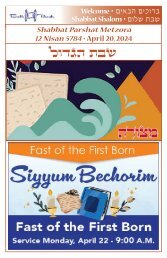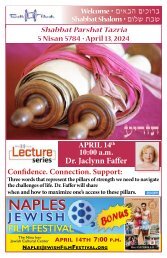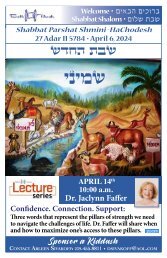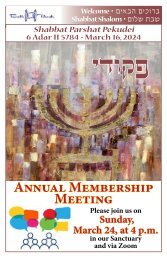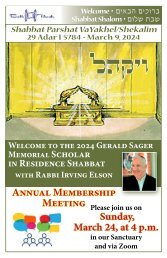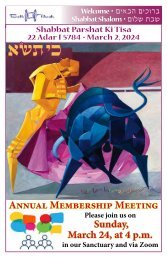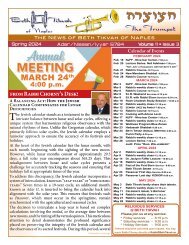Create successful ePaper yourself
Turn your PDF publications into a flip-book with our unique Google optimized e-Paper software.
Welcome • ohtcv ohfurc<br />
Shabbat Shalom • ouka ,ca<br />
Shabbat <strong>Bamidbar</strong><br />
29 Iyar 5783 • May 20, 2023<br />
and IN Person<br />
Thursday May 25 th<br />
- Erev Yom Tov: 6:15 p.m.<br />
- Tikkun Lel Shavuot: 7:00 p.m.<br />
Friday May 26 th<br />
- Yom Tov & YIZKOR: 9:00 a.m.
Yahrtzeiten<br />
vfrck 120 oburfz sg<br />
May 20 • 29 Iyar Neil W. Randall – Son of Leroy & Libby Randall<br />
Harry Myers – Father of Marian Engel<br />
Al Pavlo<br />
– Father of Francine Kaufman<br />
Harry J. Dunn – Father of Norma Rosen<br />
May 21 • 1 Sivan Martin Weiss – Father of Judy Fant<br />
Ira Schwartz – Brother of Elliot Schwartz<br />
Victor Rosenberg – Father of Alan Rosenberg<br />
Zetta Wreschner – Mother of Herbert Wreschner<br />
Simon Mest<br />
– Brother of Stuart Mest<br />
May 23 • 3 Sivan Marvin Chartoff – Husband of Janice Chartoff<br />
May 25 • 5 Sivan Eleanor Blatt – Sister of Stephen Iser<br />
Birthdays<br />
May 20<br />
May 24<br />
May 25<br />
May 26<br />
Anniversaries<br />
Speedy Recovery<br />
Sam Geist<br />
Rafaella Daniyar<br />
Judy Fant, Hannah Castro<br />
Eleanor Scheffler<br />
May 22 Sandy & Barry Barber (1)<br />
May 24 Judy & Ray Fant (32)<br />
jna `skuv ouh<br />
vnka vtupr<br />
We extend our best wishes for a speedy recovery to Jack Brown<br />
Shabbat Kiddush Sponsored by:<br />
Judy & Ray Fant<br />
In honor of Judy’s birthday,<br />
their anniversary<br />
and their going home to Ohio for 3 months<br />
Mavens: Rosalee Bogo & Steve Chizzik<br />
Assisted by: Fran Kaufman, Roberta Miller,<br />
Linda & Shep Scheinberg<br />
Sponsor a<br />
Kiddush<br />
cuy kzn<br />
Contact Arleen Sivakoff:<br />
dsivakoff@aol.com • 239.455.8811
Torah & Haftarah Readings:<br />
Shabbat <strong>Bamidbar</strong>: Numbers 1:1-4:20 (Etz Hayim p. 769)<br />
1. 1:1-4 2. 1:5-16 3. 1:17-19 4. 1:20-27<br />
5. 1:28-35 6. 1:36-43 7. 1:44-54 M. 4:17-20 (p.785)<br />
Haftarah: I Samuel 20:18-42 (Etz Hayim p. 1216)<br />
Torah / Haftarah Summary<br />
D’var Torah: Singing into Silence - Bex Stern-Rosenblatt<br />
When counting people, whether for a national census or for a wedding<br />
guest list, it is easy to be reminded of those who are no longer with us. We<br />
are struck by both the births and the deaths. In this week’s parashah, we<br />
are forced to confront, yet again, the deaths of Aaron’s sons, Nadav and<br />
Avihu, as we record their existence and their childless demise. Immediately<br />
afterward, we learn that the tribe of Levi is to be assigned to serve Aaron,<br />
doing the work necessary for the Tabernacle. While Aaron and his<br />
remaining sons are the kohanim, the priests, the Levites are given to them<br />
to serve them.<br />
The precise role of the Levites is shrouded in mystery. We do not know what<br />
it means exactly to serve the kohanim. We know they are superb movers, as<br />
we read in this parashah of their duties in dismantling, transporting, and<br />
rebuilding the Tabernacle during its wilderness journey. We know that they<br />
are guards of the Tabernacle, charged with camping out around it in order<br />
to keep it safe. We also read in our parashah that the Levites “serve” the<br />
Tabernacle, just as they are to serve Aaron and his sons. This description is<br />
unclear - we do not get details on what the terms of their service are.<br />
Looking elsewhere in the Tanakh helps us to fill in the gap, providing us<br />
more Levitical jobs that might have been indicated by the service to the<br />
Tabernacle and to Aaron and his sons as mentioned in our parashah. In<br />
many other places, we learn that the Levites sang as their service. The Book<br />
of Chronicles describes the whole ensemble - “David also commanded<br />
the chiefs of the Levites to appoint their kindred as the singers to play on<br />
musical instruments, on harps and lyres and cymbals, to raise loud sounds<br />
of joy.” It continues to describe Levites offering praise to God through<br />
playing music, especially after the completion of the Temple. Moreover,<br />
many of the songs located in the Book of Psalms are attributed to Asaph,<br />
a Levite. The Mishnah (Tamid 7:4) explains that the Levites would recite<br />
the daily song for the week from the Book of Psalms. Likewise, we read<br />
elsewhere in the Mishnah of the Levites recitation of the fifteen Psalms of<br />
Ascent during Sukkot, accompanied by all sorts of musical instruments.<br />
In the Tosefta (Pesachim 4:11), we read how the Levites would sing the<br />
Psalms of Hallel as the Pesach sacrifice was offered.<br />
While it is possible that all of this singing is a later innovation, happening<br />
long after the story of the wilderness, I prefer to read the singing as latent in<br />
our parashah. The Levites are by their very nature singers, waiting and ready
to burst into song. But the conditions are not yet right. Yehezkel Kaufman<br />
called this phenomenon “the sanctuary of silence,” mikdash hademama.<br />
Our Tabernacle at this point was only visual, lacking the noises, the words,<br />
the songs which would eventually fill the Temple.<br />
The silence of the Tabernacle mirrors Aaron’s silence. When he learns of the<br />
death of his sons, we read that he fell silent, vayidom. Now, in our parashah,<br />
Aaron is still silent. We read once more of the death of his sons. Taking the<br />
census, we come face to face with our losses. Aaron grieves not only Nadav<br />
and Avihu but also the future generations that will not rise from them. It<br />
is into this grief, into this silence, that Moses introduces the Levites. The<br />
Levites, who serve in place of the dedication of our firstborn sons to God,<br />
also serve to comfort Aaron of the loss of his firstborn sons. They stand,<br />
ready to serve, helping Aaron erect the physical space and keep it safe. But<br />
they also serve as singers, as reminders of hope and happiness. Silent in our<br />
parashah out of respect for Aaron’s loss, they are at the ready to raise their<br />
voices to turn mourning into joy.<br />
Join Rabbi Chorny<br />
for his weekly discussion<br />
group, Tuesdays at<br />
12:15 p.m. via<br />
Office Hours:<br />
Weekdays<br />
from 10:00 a.m. to 2:00 p.m<br />
Gillian can be reached at<br />
(239) 434-1818<br />
Share the news of your Simchas with us…<br />
• Birth of a grandchild,<br />
• Marriage of a child,<br />
• Bat/Bar Mitzvah in the family<br />
Rabbi’s Office Hours:<br />
Tuesdays and Thursdays<br />
from 10 a.m. to noon.<br />
Or call his cell (239) 537-5257<br />
to make an appointment.<br />
Beth Tikvah of Naples<br />
1459 Pine Ridge Road<br />
Naples, FL 34109<br />
239 434-1818<br />
Visit us online at<br />
bethtikvahnaples.org<br />
or scan the QR code<br />
to go there directly






